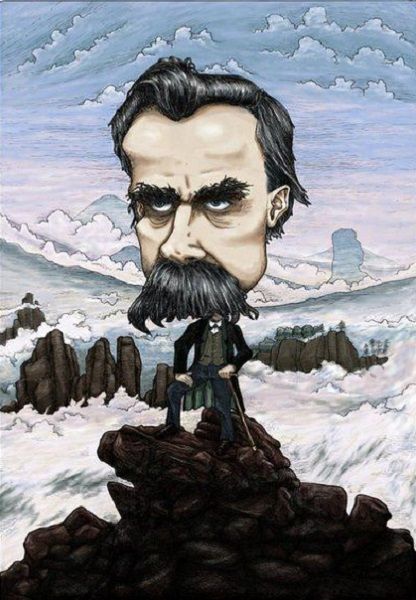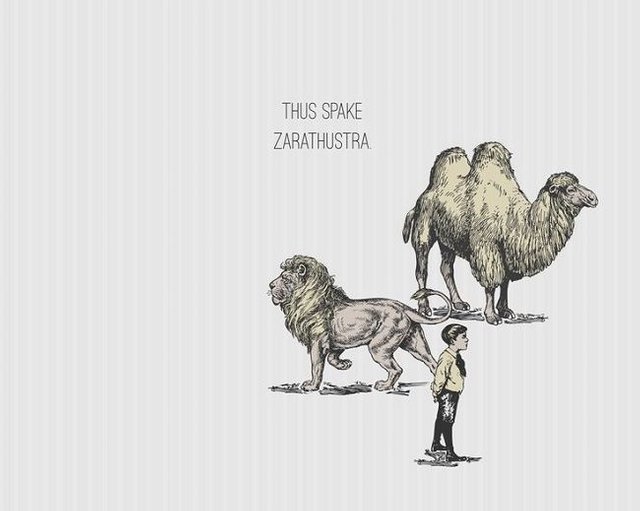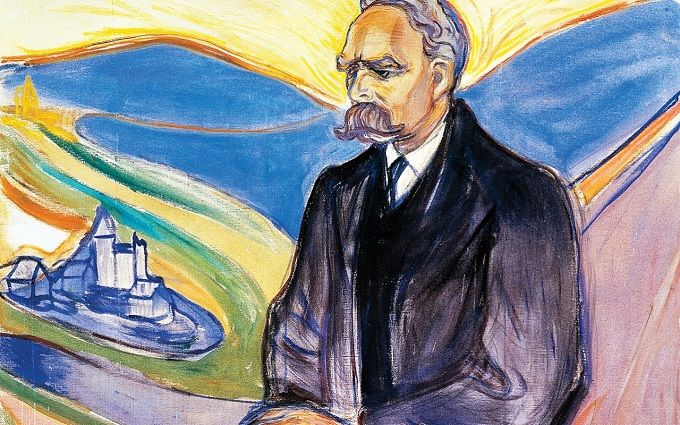
The Idea of Nietzsche's Superhuman
The idea of superhuman and criticism of Christianity are the two main themes in Nietzsche's philosophy. He defines Buddhism and Christianity as nihilistic religions. According to Nietzsche Christianity has degenerated as a rebellion initiated by the Jews and translated the New Testament as a gospel for the lowest parts of the society. Christianity was a fateful lie, it denied pride and great responsibility, lust and knowledge, all good things. In connection with the idea of "Also sprach Zarathustra ", Nietzsche said that the basic concept, the thought of eternal return, originated in August 1881, on a sheet of inscription "6000 steps beyond man and time". The first part of "Also sprach Zarathustra ", Nietzsche wrote in February 1883, and the end was written in the hour of Wagner's death. For the first readers, the book remains misunderstood, for which Nietzsche says that the book is proof of how to speak clearly but not to be heard. Its purpose is to translate its own voice as a medium of supernatural powers.
This is a perfect escape beyond itself, an abyss of happiness, this is his necessary world, a storm of feelings of freedom, moment and divinity. The poet-philosopher's inertia is presented in the book. Zarathustra is the first amoralist who bears the exclusivity of the Persians, who first thought history, and at the beginning of each story always stands a prophet.
In the parables of Zarathustra is the primal wisdom of the Superhuman. Man is something to be overcome because the meaning of Earth is the will of the superhuman. What is great in man is that he is a bridge, not a goal - a rope over the abyss. Zarathustra trails those who write new values on new scripts. This, Nietzsche called a new truth between dawn and dawn. In the way of the over-spirited spirit, the great dragon mentions "you are obliged," and the lion's spirit says, "I want." Every scaled is a value of 1000 years of creation. The Spirit creates new values and it is needed to win them. A holy "to be" is the game of creation, and it is the will of the world. It is very difficult for the being to "speak". The indifference of a man, Nietzsche says, has always been among the foolishness of God's disgusting. These are dark times, when the intellect is the goddess. What the spirit knows, it never ends in itself. Tsuetes are considered the limit of spirituality, but the essence of things is unknown wisdom. There is more reason in the created flesh than in the best wisdom. The spirit is a creation of one's own will, and Nietzsche denies the way of the soul that has been renounced by the living flesh. Good as essence is virtue only if it is desired as a law of God, not as a necessity for man. My Self, Nietzsche says, has been the cause of the lowering of man, because once the spirit was God, then He became a man, and now He is already ragged. Wisdom is higher, and it is in the parable that the sublime spirit looks down, while the downward trail goes up, and that is the valiantness of the slave as a passionate individualist. Nietzsche denies the state and defines it as death for the peoples. Where the state ceases, there begins the man. It, the state is invented for the superfluous. If mankind lacks a goal and it is missing, Nietzsche says, the spirit regains bliss as the ruler of a wise soul. The symbols of such sublimity are the virtues of the superhuman, and the path is upward from the genus to the supernatural. Thousands of ways have gone, and a chosen one will give birth to the superhuman.

In "Also sprach Zarathustra ," Nietzsche described the "Superhuman" - the concept of a man who overcame himself and reached a state of freedom and creativity. He is free from the influence of society and is in harmony with the deep, creative, immoral spirit of existence. The superhuman creates his own values and dances in the game of life in the melody of his own soul. Nietzsche presents three "spiritual" metamorphoses that one has to go through to reach the state of Superhuman. These transformations are rather recommended and can be regarded as a "guide" for reaching the Superhuman or for releasing the spirit.
The first metamorphosis: The Camel
The first metamorphosis described by Nietzsche is that of the camel. For it, he writes:
What is difficult? asks the spirit that would bear much, and kneels down like a camel wanting to be well loaded. What is most difficult, O heroes, asks the spirit that would bear much, that I may take it upon myself and exult in my strength?
After this passage, Nietzsche continues with the list of things that can be considered one of the most difficult life experiences. He claims that the camel should invite these difficulties. He writes, "Or perhaps: to love those who despise us and to give your hand to the specter when he wants to inspire you, horror." According to Nietzsche, before he can become a superhuman, he has to bear too much weight. He has to fight fear, love, truth, death, confusion, the thirst for knowledge, and all other aspects of human existence. The camel embraces these challenges in the name of debt and nobility. In other words, the camel does not try to avoid life or distract from it. It collides directly with it and manages the difficulties, but makes it a sense of duty to society or moral teachings instead of something else. Thus the camel humbles and heals. Only by meeting these challenges the camel acquires the power and endurance necessary to achieve the next spiritual metamorphosis.
Nietzsche compares the Christian with a camel. In order to bear the burdens borne by the Christian moral vault, he must have a lasting spirit. He wants and is ready to take the heaviest burden: to humiliate himself to hurt his arrogance; to forsake his foolishness to shine, to laugh at wisdom; for the truth to suffer his soul; when he is sick, to send comforts to their homes to make friendship with the deaf who will never hear it; to love those who despise him and to give his hand to the specter when he wants to give him horror. So he walks through his wilderness. Nietzsche finds an extremely accurate metaphor not only for the godly Christian but also for the Christian morality. For him, he is a great dragon who calls himself "obliged". Through this "duty" the German philosopher brings to the foremost the most essential in the Christian morality - its normality. The emphasis is on the extraordinary place of debt and the requirement that it be executed at all costs.
The second metamorphosis: The Lion
Nietzsche continues with the description of how the camel, before becoming a lion, enters the "lonely desert". The metaphor of the lonely desert can be interpreted as follows: The camel has sought out and invited the difficulties that life can offer. By doing so, it becomes somewhat alienated. It becomes different from the others and the society that created it; it begins to question the existence, its value and that of its activities. The desert can be seen as a place of existential crisis in which the camel reflects on the existence of universal laws or virtues to guide and reconcile it. The camel is forced to confront the possibility that they will not exist, and thus have to become a lion. Nietzsche writes:
Here the spirit becomes a lion who would conquer his freedom and be master in his own desert. Here he seeks out his last master: he wants to fight him and his last god; for ultimate victory he wants to fight with the great dragon. Who is the great dragon whom the spirit will no longer call lord and god? “Thou shalt” is the name of the great dragon. But the spirit of the lion says, “I will.” “Thou shalt” lies in his way, sparkling like gold, an animal covered with scaled; and on every scale shines a golden “thou shalt.” My brothers, why is there a need in the spirit for the lion? Why is not the beast of burden, which renounces and is reverent, enough? To create new values—that even the lion cannot do; but the creation of freedom for oneself for new creation—that is within the power of the lion. The creation of freedom for oneself and a sacred “No” even to duty—for that, my brothers, the lion is needed. To assume the right to new values—that is the most terrifying assumption for a reverent spirit that would bear much.

The camel must reject the dragon of tradition and guidance, but it can not be of its loving long form. That is why it must become a lion. Its life experience and allowed to gain enough strength. The lion symbolizes courage, stubbornness, disappointment and even anger. Only in this state is the spirit capable of pronouncing the "sacred No". It represents the complete rejection of external control and traditional values. Everything imposed by people, society, church, governments, families, and all forms of propaganda must be rejected by a colossal lion roar. The lion does not have to believe that all the virtues and values imposed by such subjects are inappropriate. In fact they can be useful and worthy. However, their rejection is necessary as they come from external authority and are masked as something absolute. The superhuman rejects all absolutes and must create his world entirely from within; so he has to create its own values and conditions. The battle between the lion and the dragon aims to fight the lion and overcome the old, rigid values that have been imposed and to replace "You are!" With "I WANT!". What he can achieve is freedom for new values by saying the sacred "No!" And thus exhausting his task.
The third Metamorphosis: The Child
After the lion has presented the "sacred No," the spirit must make another transformation to become Superhuman. He must become a child. Nietzsche writes:
But say, my brothers, what can the child do that even the lion could not do? Why must the preying lion still become a child? The child is innocence and forgetting, a new beginning, a game, a self-propelled wheel, a first movement, a sacred “Yes.” For the game of creation, my brothers, a sacred “Yes” is needed: the spirit now wills his own will, and he who had been lost to the world now conquers his own world.
The child, which is "innocence and forbidding," is the new beginning from which the circle has to start spinning again. Here again, we see a reference to Christ's sermons that the child is innocent and immaculate, which is only capable of entering into the kingdom of God, and if men aspire to eternal grace, they must become children; to become spiritually pure. Nietzsche contemplates Zarathustra as a prophet-poet. Oxymoron is preferred by the philosopher to express the moral sense in the artistic creation of the work. Zarathustra lived for ten years in the mountains where he listened only to the sounds of nature, and there he enjoyed his loneliness and spirit and went down the mountain to bring the truth to the people he left his peace. Zarathustra is the prophet who must prepare the appearance of the superhuman, but what distinguishes him from other prophets is that Zarathustra does not seek to conquer followers. The goal is to preach the truth. When a prophet preaches his doctrine, he declares it and does not seek to give another perspective, and the antithesis is undesirable because another opinion appears and the boundaries between truth and lies are blurred.
A good introduction, @godflesh (and wonderful images) to a complex and much misunderstood thinker.
The one thing missing I think is the mystical dimension of Nietzsche. His 'twin soul' Lou Salome said that was the most important, and overlooked, aspect of his temperament: that he came from religion and was heading towards prophesy - with heroes of the spirit for followers.
Here's an excerpt form a long essay in my book, Trial by Ink, where I contrast those 2 great contrarians: Nietzsche & Oscar Wilde:
https://philosophynow.org/issues/94/The_Twin_Souls_of_Oscar_Wilde_and_Friedrich_Nietzsche
I hope you enjoy it, Yahia
Downvoting a post can decrease pending rewards and make it less visible. Common reasons:
Submit
Thank you again. I will read it. Have you read Carl Jung's lectures about "Also sprach Zarathustra "? They are one of my favorite about Nietzsche's philosophy. It is a very big work.
Downvoting a post can decrease pending rewards and make it less visible. Common reasons:
Submit
Y'know, I'm not sure, now, if I did read Jung's lecture (it seems so long ago I was immersed in this) but I will check it out, thanks!
Also, if you have a hard time reading my article, because of firewall, etc.. I just posted on Steemit: https://steemit.com/blog/@yahialababidi/the-twin-souls-of-oscar-wilde-and-friedrich-nietzsche
Downvoting a post can decrease pending rewards and make it less visible. Common reasons:
Submit
I attempted to read Zarathustra (downloaded from Project Gutenberg) 14 years ago. I gave up after several pages. Couldn't make out what the author was trying to impart. I guess I'm not made for this kind of heavy reading.
Downvoting a post can decrease pending rewards and make it less visible. Common reasons:
Submit
Many people have this problem. My personal opinion is that you must read first everything from Nietzsche and then get involved with Zarathustra.I have already read Zarathustra for the third time, and I still have not studied it enough. It takes time and patience. :)
Downvoting a post can decrease pending rewards and make it less visible. Common reasons:
Submit
Hello!
It is a wonderful .
Thanks for the article
Downvoting a post can decrease pending rewards and make it less visible. Common reasons:
Submit
Thanks :)
Downvoting a post can decrease pending rewards and make it less visible. Common reasons:
Submit
awesome post. thanks for sharing...
Downvoting a post can decrease pending rewards and make it less visible. Common reasons:
Submit
You are welcome :)
Downvoting a post can decrease pending rewards and make it less visible. Common reasons:
Submit